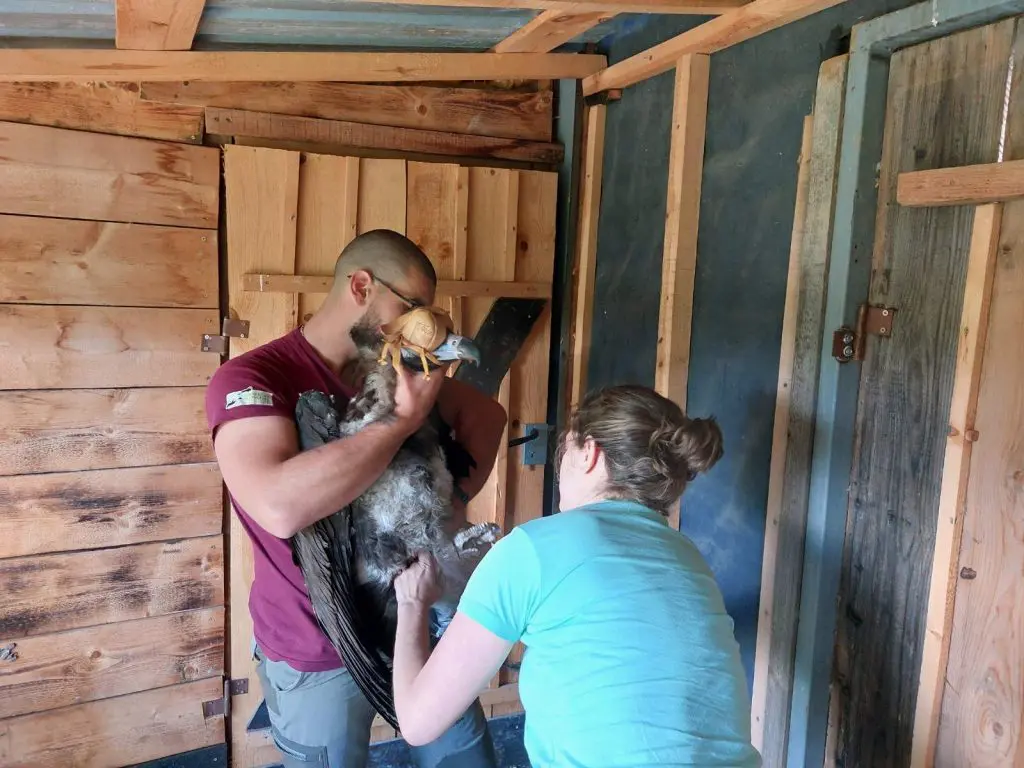A three-day Vulture Festival held in Madzharovo, Bulgaria, has marked the launch of the new LIFE project, “Restoration of the Cinereous Vulture Population and Trophic Chain in the Bulgarian-Greek Cross-border Region” (LIFE Rhodope Vultures). This project, coordinated by the Bulgarian Society for the Protection of Birds (BSPB) in collaboration with the Rewilding Rhodopes Foundation, seeks to bring back the rare Cinereous vulture to the region. Few days before the event a group of six Cinereous Vultures, transported from Spain, occupied the local adaptation aviary. They will be released next spring and help boost the Cinereous Vulture population in the Balkans.

Celebrating vultures conservation
The three-day Vulture Festival in Madzharovo was the perfect chance for the Bulgarian Society for the Protection of Birds (BSPB) and the Rewilding Rhodopes Foundation to celebrate the International Vulture Awareness Day and officially present to the public the new LIFE project “Restoration of the Cinereous vulture population and trophic chain in the Bulgarian-Greek cross-border region”.
The event was attended by more than 300 people from across Bulgaria and included a variety of games, presentations, film screenings, and exhibitions. One of the most popular events was the game “Eco-Adventurers in Search for Vultures,” which engaged over a hundred children who explored Vultures nature through interactive challenges. Children also participated in the play “The Wizard’s Legacy,” an educational and theatrical experience that captivated audiences with a unique friendship story between a vulture and a blue whale.
Guests also had the opportunity to visit the BSPB’s “Eastern Rhodopes” Conservation Centre, joining birdwatching sessions and guided walks led by experts. The festival created an immersive experience, allowing people to connect with nature and learn about vulture conservation in a fun and engaging environment.



Supporting Cinereous Vultures in the Balkans
The key moment of the festival was the official presentation of the new LIFE project, “Restoration of the Cinereous Vulture Population and Trophic Chain.” This five-year project (2024–2029) aims to establish a new Cinereous vulture colony in the Bulgarian Rhodopes and to support the only existing breeding colony in Greece, located in Dadia-Lefkimi-Soufli National Park.
The small population in Greece still experiences high unnatural mortality which threatens its long-term survival. Over the course of the project, the team will work to reduce the main threats to vultures survival, such as poisoning, poaching, and collisions with energy infrastructure. They will also focus on improving the food base for vultures to prevent and mitigate conflicts between human and wildlife. Lastly, it aims to promote a sustainable economy that benefits local communities and nature.
The festival itself was part of the project and was also supported by the “Green Belt of Southeastern Bulgaria” project, funded by the Endangered Landscapes Programme (ELSP). It is part of the efforts made to involve local communities and raise awareness about Cinereous Vultures importance and fragile conditions.

Starting off on the right foot
A few days before the official presentation of the LIFE projects, Cinereous Vultures (Aegypius monachus) arrived in the adaptation aviary in the Rhodope Mountains. The vultures come from Spain and were provided by the Spanish NGO GREFA (Grupo de Rehabilitación de la Fauna Autóctona), which rescues and rehabilitates injured wild birds. A team of experts from the Bulgarian Society for the Protection of Birds (BSPS) monitors their conditions to make sure that they are adapting well to their new environment. They will be released next spring as part of the restoration programme included in the LIFE project.
The Cinereous vulture is one of the rarest birds in the Balkans. Once widespread in Bulgaria, the last breeding pair was recorded in 1993. The Dadia National Park colony is very small in size, only 32 pairs, and its growth rate is quite low. This makes it particularly vulnerable to anthropogenic threats, like poisoning and poaching, and natural phenomena like the wildfire that destroyed almost the whole breeding area of the species in 2023.
The team hopes that the newly arrived six individuals, together with those released in the past two years, will soon start to establish a new breeding colony in Bulgaria and support the entire Cinereous Vultures population in the Balkans.
As the new Cinereous Vultures settle in their adaptation aviary in the Rhodope Mountains, and the new LIFE project kicks off, we celebrate another important step towards securing a future for this species in Greece, Bulgaria and all over Europe.




